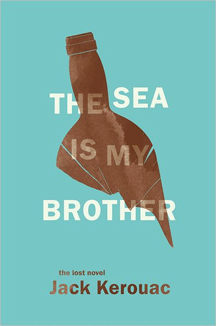By Lewis Fried
For much of his all-too brief life, Kerouac was seen as a “sport” in American letters: a writer who came out of a small town ( Lowell, Massachusetts), and whose literary reputation would finally rest on a single book, On the Road. Because of that novel’s energy, and America’s wonderment about the Beats, whose core he was at, Kerouac helped illuminate the frustrations of American youth ( and often their parents). Marked by what many then-contemporary critics saw as threats to normalcy—a search for mystical enlightenment, drugs, sex, a revolt against middle-class life and its daily obligations, wandering without ties—could these Beats have really been a beatific generation? Yet, they produced an extraordinary literature that spoke of and against their times. As their writing became recognized for its transformative power, so, too, did they come to be seen as writers in a genuinely American grain. And what a vista of America they put before us: a new individualism with its own rites of journey, and the chance for a chosen life , though pockmarked by joy and desperation.
The Sea Is My Brother,written in 1943, has now been published in its entirety. It is the ground from which most of his later works grew. Call it a “trying out.”This novel has the mature Kerouac’s signature written all over it because he discovered his central themes early.The call of liberation, the “barbaric yawp” as Whitman put it, of the untrammeled self resounds on almost every page, and is just as dramatically countered here by the claims of responsibility and obligation. There could be no way, in this novel for these not to collide; there would be no chance that either viewpoint could push aside the other. Kerouac wouldn’t let this happen.
Kerouac’s service in the Merchant Marine on the S.S. Dorchester fresh in mind, and his journal “Voyage to Greenland” serving as a source of recall , he wrote The Sea Is My Brother. Spirited and compact, it celebrates not so much the open life, but rather the will to have one. The novel is a dialogue between Kerouac’s yearning for autonomy and his practical sense. Like any adventurous young person, he longed for wide vistas . Kerouac had seen the immensity of them on the Dorchester, and listed a host of countries that he hoped to intrigue a friend to see with him. From Mediterranean ports to the distant Polynesians, he urged his friend to travel with him, as if he were welcoming a tempestuous relationship that would fuel his creativity.
In the novel, the two characters who question and answer each other are Wes Martin, a seaman A.B., broke, magnetic, and responsible only to his urgings and loss (as he understands his situation) and the almost self-loathing, bored assistant professor (once called an “instructor”) of English, Bill Everhart.The two are the attracting poles of the book. They’re stick figures, if not straw men, but Kerouac breathes life into them.Thirty-two years-old, living with his father, and an extended family, Everhart is a cafeteria hero. He can’t talk without alluding to literature; he pontificates about politics; his experience of the world is limited. On the contrary, Martin, age 27, is a literal vagrant, having left his wife years before, passing through a host of cities, and at home on the sea. When we meet him, he has just blown away eight-hundred dollars in fifteen days. He’s looking for a berth, and money. (Yes, he has read a book , and he tells us flatly it was Moby-Dick, Kerouac reminding us of his own aspirations. )The two men find each other in a New York City cafeteria- bar, and so compelling is Martin’s way-of-life, and so hollow is Everhart’s, that they hitch to Boston to serve on the S.S. Westminster, a transport-cargo ship in the company of a destroyer. Security and familiarity are left behind as the ship plows northward in a submarine-haunted ocean. One can feel the grinding agony of anxiety.
Kerouac gives us a grand setting: the sea will be Everhart’s education. And, it starts to become just that.He is stripped bare of pretention. He is now a common mess-boy. He meets people who live their commitments as well as their weaknesses. Kerouac offers us debates (albeit mechanical and undeveloped) about politics and freedom. Nevertheless, Everhart now understands the obligations of being in a closed community . He has to; his life is at stake. In a tour de force, there is a prayer for safety. In the last pages a baker preaches and prays on deck. This may be grand spiritual metaphor, but the enemy, running silently under the waves, is real. Life is immediate and visceral. So is this book.
Lewis Fried (ΦBK, Queen’s College, CUNY, 1964) is Professor of English Emeritus at Kent State University and a resident member of the Nu of Ohio chapter of Phi Beta Kappa.




